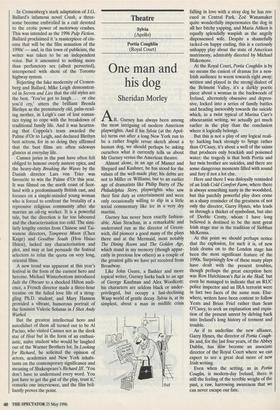Theatre
Sylvia (Apollo) Portia Coughlin (Royal Court)
One man and his dog
Sheridan Morley
R. Gurney has always been among the most intriguing of modern American playwrights. And if his Sylvia (at the Apol- lo) turns out after a long New York run to be a rather fragile revue sketch about a human dog, we should perhaps be asking ourselves what it currently tells us about Mr Gurney versus the American theatre.
Almost alone, in an age of Mamet and Shepard and Kushner, he has stood for the values of the well-made play; his debts are not to Miller or Williams, but to an earlier age of dramatists like Philip Barry of The Philadelphia Story, playwrights who saw their first duty as entertainment and were only occasionally willing to slip in a little social commentary like ice in a very dry martini.
Gurney has never been exactly fashion- able. Alan Strachan, in a remarkable and underrated run as the director of Green- wich, did pioneer a good many of the plays there and at the Mermaid, most notably The Dining Room and The Golden Age, which stand in my memory (though appar- ently in precious few others) as a couple of the greatest gifts we have yet received from Broadway.
Like John Guare, a flashier and more topical writer, Gurney harks back to an age of George Kaufman and Alex Woollcott: his characters are seldom black or under- privileged, but occupy a fast-declining Wasp world of gentle decay. Sylvia is, at its simplest, about a man in midlife crisis falling in love with a stray dog he has res- cued in Central Park. Zoe Wanamaker quite wonderfully impersonates the dog in all her bitchy yapping, and Maria Aitken is equally splendidly waspish as the angrily dispossessed wife. Despite a shamefully tacked-on happy ending, this is a curiously unhappy play about the state of American matrimony, admirably directed by Michael Blakemore.
At the Royal Court, Portia Coughlin is by no means the easiest of dramas for a non- Irish audience to warm towards right away; written and played in the strong dialect of the Belmont Valley, it's a darkly poetic piece about a woman in the backwoods of Ireland, alternately obsessive and depres- sive, locked into a series of family battles and heading inexorably towards the suicide which, in a twist typical of Marina Can's obscurantist writing, we actually get much earlier in the play than the conclusion where it logically belongs.
But this is not a play of any logical reali- ty: harking back strongly to Synge rather than O'Casey, it's about a well of the saints that produces only brackish and poisoned water: the tragedy is that both Portia and her twin brother are suicides, and there are some dangerous moments filled with sound and fury if not a lot else.
Here and there I was disloyally reminded of an Irish Cold Comfort Farm, where there is always something nasty in the woodshed, but this patchily powerful play does come as a sharp reminder of the greatness of not only the director, Garry Hynes, who leads us through a thicket of symbolism, but also of Derble Crotty, whom I have long believed is destined to be the next great Irish stage star in the tradition of Siobhan McKenna.
At this point we should perhaps notice that the explosion, for such it is, of new Irish drama on to the London stage has been the most significant feature of the 1990s. Surprisingly few of these many plays have dealt with the present troubles, though perhaps the great exception here was Ron Hutchinson's Rat in the Skull, but even he managed to indicate that an RUC police inspector and an IRA terrorist were in fact two faces of the same man. Else- where, writers have been content to follow Yeats and Brian Friel rather than Sean O'Casey, to seek an explanation and expia- tion of the present unrest by delving back into Ireland's long history of torment and trouble.
As if to underline the new alliance, Garry Hynes, the director of Portia Cough- lin and, for the last four years, of the Abbey Dublin, has now become an associate director of the Royal Court where we can expect to see a great deal more of new Irish writing.
Even when the setting, as in Portia Couglin, is modern-day Ireland, there is still the feeling of the terrible weight of the past, a raw, harrowing awareness that we can never escape our fate.


























































 Previous page
Previous page